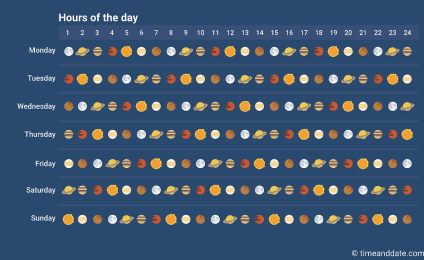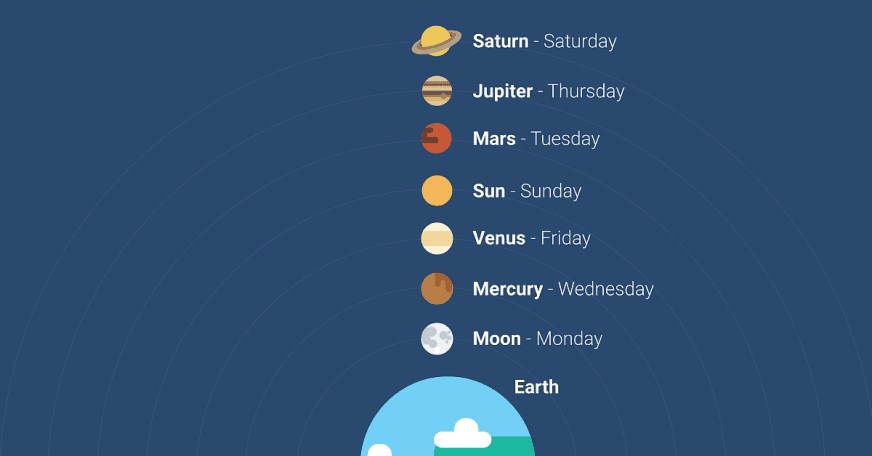Duis magna risus, convallis vel purus eu, sollicidin volutpat velit.
Praesent turpis quam, dapibus id diam a, cursus lobortis mi. Praesent nec lorem eget nisi sodales vehicula etiam sagittis dapibus.
There’s only one thing that every single culture, religion, and country in the world, agrees on? and it’s that there are only seven days in the week. Not one more or not one less. The reason why we organize our lives around a 7-day week is, quite literally, above our heads. Like many other calendars, today's Gregorian calendar is ultimately based on the phases of the Moon. It takes the Moon around 29.5 days to cycle through all Moon phases. For everyday purposes, this is a fairly long and impractical time span, so it makes sense to break it down into smaller segments.

Enter the Babylonians. This ancient society, which lived in Mesopotamia in what is now Iraq, rounded the Moon cycle down to 28 days and divided this time span into 4 periods of 7 days each, using leap days to stay in sync with the Moon phases in the long run. This 7-day structure is also believed to have ultimately informed a number of popular creation myths, such as the Book of Genesis in the Hebrew and Christian Bibles, which states that God created the world in seven days: six days of work followed by one day of rest.
Thousands of years ago there was no iPhone or watches to tell the time. So they would look up at the planet and their positions to guess it! They saw seven planets including the sun and the moon. Believe that each had superpowers. so they started to worship them. One planet will be the God of Justice, one planet will be the god of love. And just like that, every planet becomes a god. They wanted this god to watch over them 24/7. So they assign on god to every hour of the day. and eventually, they even gave a whole day to each. AND THAT’S HOW WE ENDED UP WITH 7 DAYS FOR 7 GODS.
Christians, Muslims, Jews, Europeans, Arabs, Asians and from china to Antarctica everybody has 7 days a week.
There’s only one thing that every single culture, religion, and country in the world, agrees on? and it’s that there are only seven days in the week. Not one more or not one less.
Jamel Eusebio
Enter the Babylonians. This ancient society, which lived in Mesopotamia in what is now Iraq, rounded the Moon cycle down to 28 days and divided this time span into 4 periods of 7 days each, using leap days to stay in sync with the Moon phases in the long run. This 7-day structure is also believed to have ultimately informed a number of popular creation myths, such as the Book of Genesis in the Hebrew and Christian Bibles, which states that God created the world in seven days: six days of work followed by one day of rest.
The names of the 7 days of the week in most Latin-based languages come from the Roman calendar, which related each day to 7 celestial bodies considered to be gods: the Sun, the Moon, Mercury, Venus, Mars, Jupiter, and Saturn. The English language has retained the planet names for Saturday, Sunday, and Monday. However, the names for the other days of the week have been replaced by their equivalent Norse or Germanic gods.

As the first day of the week varies in different cultures, so does the weekend. The Christian or Western world marks Sunday as their day of rest and worship, while Muslims refer to Friday as their day of rest and prayer. The Jewish calendar counts Saturday – the Sabbath – as the day of rest and worship. Both Saturdays and Sundays are common days of rest in the calendar. Calendars in some countries use a separate color for the weekends and reserve the black or gray fonts for the weekdays, Monday through Friday.
A common year roughly adds up to 52 weeks of 7 days each plus 1 day – or 2 days, if it's a leap year. However, countries vary on exactly how they present and number the of weeks in their calendar.
The weeks of the year in a Gregorian calendar are numbered from week 1 to week 52 or 53. If a year, and week 1, starts on a Thursday, then the weeks are shifted so that there will be 53 weeks in that year. These week numbers are commonly used in some European and Asian countries; but not so much in the United States.

Avid astronomers and astrologers, the Babylonians developed a kind of horoscope around 500 BCE where each day of the week was assigned to one of the classical planets – the seven non-fixed celestial bodies visible to the naked eye. These are the Sun, the Moon, Mars, Mercury, Jupiter, Venus, and Saturn. Some historical sources claim that the connection between the days of the week and the classical planets was introduced later by the ancient Greeks.
Morbi risus elit, fringilla in cursus a, molestie non dui. Nunc accumsan gravida risus, ac semper libero mollis ut.
All content © 2006-Current Jamel Eusebio and respective copyright holders.